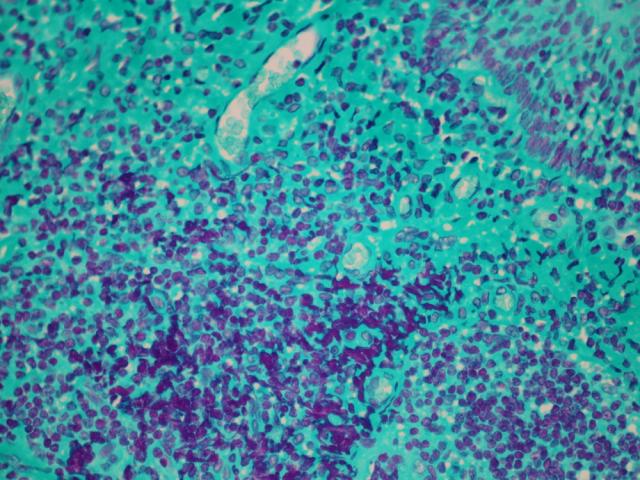Feulgen Reaction DNA Stain
Reagents for this procedure are sold as individual stain solutions and are available for purchase under separate part numbers with storage requirements and expiration date designated per bottle.
SOLUTIONS:
| 125 ml | 250 ml | 500 ml | 1 Liter | 4 Liters | |
| Hydrochloric Acid 20%, Aqueous | Part 12087A | Part 12087B | |||
| Schiff Reagent, McManus | Part 1371A | Part 1371E | Part 1371B | Part 1371C | Part 1371D |
Additionally Needed:
| Normal Tonsil Custom Tissue Slides | Part CT39790A |
| Xylene, ACS | Part 1445 |
| Alcohol, Ethyl Denatured, 100% | Part 10841 |
| Alcohol, Ethyl Denatured, 95% | Part 10842 |
| Light Green SF Yellowish Stain 0.2%, Aqueous | Part 12202 |
For storage requirements and expiration date refer to individual product labels.
APPLICATION:
The Newcomer Supply Feulgen Reaction procedure is used for the demonstration of DNA (deoxyribonucleic acid) in tissue sections.
METHOD:
Fixation: Formalin 10%, Phosphate Buffered (Part 1090)
-
-
- See Procedure Note #1.
-
Technique: Paraffin sections cut at 4 microns
Solutions: All solutions manufactured by Newcomer Supply, Inc.
All Newcomer Supply stain procedures are designed to be used with Coplin jars filled to 40 ml following the staining procedure.
PRESTAINING PREPARATION:
-
- If necessary, heat dry tissue sections/slides in oven.
- Prepare Hydrochloric Acid Working Solution; combine and mix well.
-
- Hydrochloric Acid, 20% Aqueous 16 ml
- Distilled Water 24 ml
- Preheat and maintain Hydrochloric Acid Working Solution at 60°C.
-
STAINING PROCEDURE:
-
- Deparaffinize sections thoroughly in three changes of xylene, 3 minutes each. Hydrate through two changes each of 100% and 95% ethyl alcohols, 10 dips each. Wash well with distilled water.
-
- See Procedure Notes #2 and #3.
-
- Hydrolyze sections in preheated Hydrochloric Acid Working Solution (Step #2) at 60°C for 10 minutes.
-
- See Procedure Notes #4 and #5.
-
- Place slides directly in Schiff Reagent, McManus for 45 minutes.
- Wash in running tap water for 5 minutes; rinse in distilled water.
- Counterstain in Light Green SF Yellowish Stain 0.2%, Aqueous (Part 12202) for 1 minute.
- Dehydrate in two changes each of 95% and 100% ethyl alcohol. Clear in three changes of xylene, 10 dips each; coverslip with compatible mounting medium.
- Deparaffinize sections thoroughly in three changes of xylene, 3 minutes each. Hydrate through two changes each of 100% and 95% ethyl alcohols, 10 dips each. Wash well with distilled water.
RESULTS:
| DNA | Red-purple |
| Nuclei | Red-purple |
| Background | Green |
PROCEDURE NOTES:
-
- Bouin fixed tissue is unsatisfactory for use with Feulgen reaction.
- Drain slides after each step to prevent solution carry over.
- Do not allow sections to dry out at any point during procedure.
- For optimal results preheat and maintain Hydrochloric Acid Working Solution at 60°C during the hydrolysis process.
- Prolonged exposure to hydrochloric acid may over-hydrolyze sections with poor staining results.
- If using a xylene substitute, closely follow the manufacturer’s recommendations for the clearing steps.
REFERENCES:
-
- Bancroft, John D., and Marilyn Gamble. Theory and Practice of Histological Techniques. 6th ed. Oxford: Churchill Livingstone Elsevier, 2008.224-225.
- Carson, Freida L., and Christa Hladik Cappellano. Histotechnology: A Self-Instructional Text. 4th ed. Chicago: ASCP Press, 2015. 126-127.
- Sheehan, Dezna C., and Barbara B. Hrapchak. Theory and Practice of Histotechnology. 2nd ed. St. Louis: Mosby, 1980. 150.
- Modifications developed by Newcomer Supply Laboratory.


